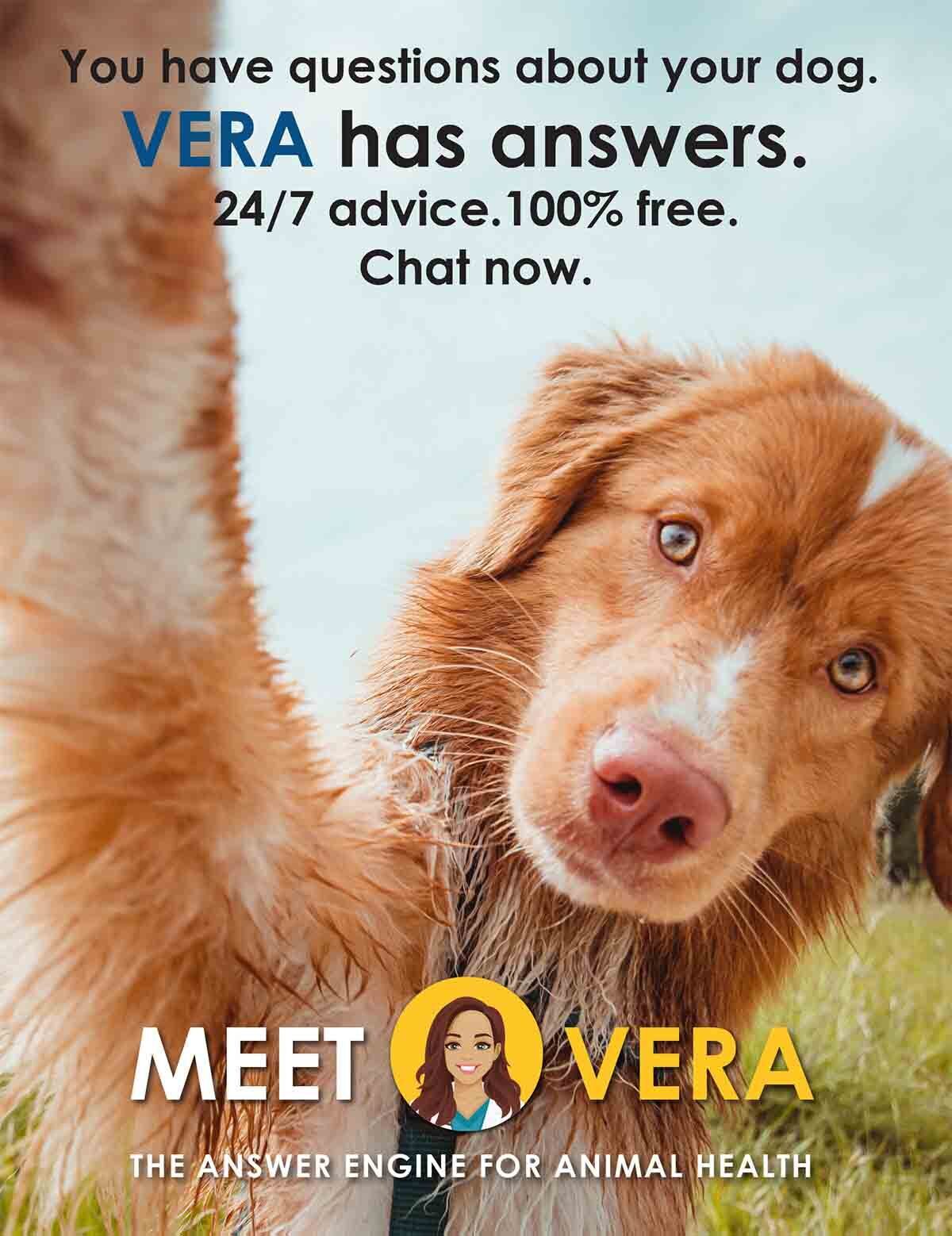If you have a dog, you’ve likely had experience with diarrhea — it comes with the territory of pet ownership, unfortunately! The list of causes for diarrhea in dogs is seemingly endless, and the treatment and prognosis are highly dependent on the underlying cause of the diarrhea, and the severity of your dog’s symptoms. Thankfully, some episodes of diarrhea resolve quickly and don’t need any treatment at all! Some are more serious and do need in-depth testing and veterinary support to decipher the cause and form a treatment plan to make that upset stomach happy again. Check out this link for more about what to do if your dog has diarrhea.
Specific Causes of Diarrhea
It seems like almost anything can cause a dog to have diarrhea! There are so many causes that we can’t possibly list them all here, but the following are some of the more common instigators of diarrhea in dogs that we see as veterinarians.
Dietary Indiscretion
By far, one of the most common causes of diarrhea in dogs is “dietary indiscretion” or eating something new or different than normal. Dogs are not the garbage disposals that we tend to think they are! Even though some dogs seem to be blessed with stomachs of steel regardless of what they may consume, most dogs are very sensitive to food changes and ingesting unfamiliar things. This poses problems for a species who also will put almost anything in their mouths–and then swallow it!
Potential stomach and intestinal irritants range from people food, new treats, garbage, plants, a piece of pizza off the street, the cat’s food … the list goes on and on, as dogs will eat some crazy things! When consulting with your AskVet or family veterinarian, providing a list of everything your dog may have consumed in the days preceding the diarrhea is helpful in determining if something your pup ate might have led to their soft or watery stool. Keep in mind that sometimes dogs sneak things without us knowing, especially if your guy is quick and always on the hunt! Depending on what your pup consumed, these episodes can be self-limiting (meaning they resolve without any help), and other times sustained diarrhea requires veterinary intervention.
Intestinal Parasites
Especially for young puppies, an intestinal parasite is a super common culprit of diarrhea. Roundworms, whipworms, hookworms, giardia, and coccidia are all common causes of intestinal problems. Seeing a few white worms wiggling around in the stool are a pretty good indication to get your pup into the vet. If you are not “fortunate” enough to see the actual adult worms, a fecal test may reveal the presence of microscopic eggs within the dog’s feces, and treatment with deworming medications can take care of parasite infections. Since parasite eggs can be found in the dirt of dog parks and water sources outdoors, it is recommended that an adult dog receives a monthly dewormer, too. These monthly dewormers are usually included in your dog’s heartworm prevention, so it’s yet another reason to keep your pup on schedule with their monthly tablets. Fortunately, this type of preventative helps keep any ingested parasite eggs from causing an infection–and diarrhea!
Food Allergy
Some dogs will have an immune reaction within the lining of the intestines to certain proteins or ingredients in the dog’s diet. This immune reaction causes difficulty in absorbing nutrients from food and promotes fluid secretion into the lining of the intestines — leading to diarrhea.
The most common dietary allergens for dogs are chicken, beef, dairy, and egg — simply because those are the most common ingredients dogs are exposed to in their daily diet. Keep in mind that dogs who are sensitive to certain foods may have diarrhea from intestinal inflammation, but they may also have itchy skin and ear infections, or even exhibit both types of reactions! If your dog’s diarrhea is also accompanied by itchy skin, make sure to tell your veterinarian so that a food sensitivity can be investigated.
At this time, there are no accurate tests to diagnose a food allergy (those salivary/cheek swab tests in pet stores are not accurate, unfortunately!). Instead, your veterinarian may recommend a food elimination trial for a period of 2-3 months using a hypoallergenic or limited ingredient/novel protein prescription diet. If the diarrhea improves or resolves during this food trial, a food allergy is the likely culprit. Note that this type of food trial is usually recommended only if your dog has repeated episodes of diarrhea over time, and other common causes (like intestinal parasites) have been eliminated as a possibility. Therefore, there’s no need to rotate your dog’s food and try different types in hopes of solving your dog’s diarrhea problem — in fact, feeding multiple new types of dog food can make diarrhea even worse.
Medications
Diarrhea is listed as a common side effect of many medications available today. For example, antibiotics are a common cause of diarrhea due to their ability to throw off that delicate balance of “good” and “bad” bacteria in the gastrointestinal tract. In order to avoid this problem, many veterinarians will often recommend the use of canine probiotics along with any prescribed antibiotics to support the good bacteria.
Some medications, like anti-inflammatories, are more likely to be associated with gastrointestinal irritation, and even stomach ulcer formation. However, ANY medication has the potential to cause gastrointestinal upset, so close monitoring when starting new medications and reporting any abnormalities to your vet is also very important.
Intestinal Viral, Bacterial and Fungal Infections
The naïve immune systems of puppies and dogs that have not been vaccinated are vulnerable to viruses that attack the intestinal tract. Parvovirus and Distemper Virus are the most common and concerning viruses that cause diarrhea in unvaccinated dogs. Vaccinating puppies and using caution to limit potential virus exposure to youngsters is important, as these viruses are very hard on the small body of a young pup and sadly can even be life-threatening. ANY puppy with vomiting, diarrhea, and low energy needs to be examined by their veterinarian immediately due to their little bodies’ inability to regulate their fluids and blood sugar, as well as test for these dangerous infections.
Depending on what your dog is eating and being exposed to in her environment, your dog may ingest bacteria that could cause diarrhea too. Clostridium, E. Coli, and Salmonella are some of the culprits, especially if your dog eats things outside (dead animals, feces, dirt, etc) or consumes a diet containing raw meat products.
In certain parts of the country, fungal diseases can make their way into the intestinal tract too (like histoplasmosis in the Ohio, Missouri, and Mississippi River valleys), causing diarrhea and intestinal issues. In the southeast, dogs can become infected with “swamp fungus” (pythiosis) by standing or swimming in warm, stagnant water. Specialized fecal, blood, and urine tests can help to diagnose the presence of a fungal or bacterial infection, and sometimes a biopsy of the intestines is needed for diagnosis. If your dog has developed diarrhea after traveling to a different part of the country, swimming in a lake, or has recently romped through the countryside, please remember to tell your veterinarian so they can be mindful of these potential pathogens.
Stress and Anxiety
Stressful situations like boarding, travel, visitors, thunderstorms, and vet visits could cause diarrhea from stress colitis in some dogs. Symptoms range from a couple of episodes of soft stool to full-blown bloody diarrhea (with vomiting) lasting multiple days. Sometimes these episodes are self-limiting (meaning they resolve without any help), and other times, sustained diarrhea requires veterinary intervention. A pattern of diarrhea after exciting or stressful events may call for an exam and blood testing with your veterinarian, and a possible trial of anxiety supplements or medication. Also, if stress colitis is suspected in your pooch, try to make alternate plans to minimize stressful situations for your pup whenever possible.
Disease Processes Involving Internal Organs (Pancreas, Liver, Kidneys, Adrenal Glands)
Internal organs contributing to digestion and intestinal health all have the ability to cause diarrhea if they are not functioning properly. Through different mechanisms, malfunction of the pancreas can result in pancreatitis and exocrine pancreatic insufficiency (EPI). Both types of pancreatic dysfunction can cause diarrhea and cause symptoms severe enough to need veterinary support.
A variety of diseases involving the kidneys, liver, and gallbladder can also affect your dog’s stool. Addison’s Disease, when the adrenal glands do not produce the necessary hormones, can also cause serious illness in dogs, including diarrhea with or without blood. Evaluating your dog’s internal organ health by testing her blood and urine, and possibly performing an abdominal ultrasound, will help diagnose these conditions so they can be appropriately treated.
Chronic Intestinal Inflammation (“Enteropathies”), Inflammatory Bowel Disease
These conditions are typically chronic, meaning the diarrhea has lasted quite some time, and the dog may be losing weight due to its long-term inability to absorb nutrients properly. This is where all the big words come in … lymphangiectasia, protein-losing enteropathy, lymphocytic plasmacytic enteropathy, granulomatous colitis, immunoproliferative enteropathy, histiocytic ulcerative colitis, etc etc. It’s helpful to think of these conditions as a group of chronic diseases that may cause diarrhea–and let your veterinarian worry about the specific classification!
Certain breeds of dogs are more commonly affected by these conditions due to a genetic inheritance — German Shepherds, Boxers, and Yorkies to name a few. These diseases are typically diagnosed with a biopsy of the intestines and treated with various food and medication trials, as well as vitamin supplementation to help calm and control the inflammation. With help from your family veterinarian, your dog’s intestines are again able to do their job and absorb nutrients properly.
Cancer
There are far more common causes of diarrhea than cancer, so please do not panic! Unfortunately, though, we can’t talk about diarrhea without including cancer as a possible cause. Tumors of the intestines like lymphoma, leiomyosarcomas, and adenocarcinomas and also tumors of organs within the abdomen, like the liver, kidney, and spleen can all be causes of diarrhea. Veterinarians are always on the lookout for “the big C”, especially for those patients who are not responding as expected to initial treatments. Usually, blood and urine testing, abdominal x-rays, abdominal ultrasound, and intestinal biopsies are helpful in the diagnosis of these tumors. Stay calm though, and rule out everything else first — cancer remains a very uncommon cause of diarrhea in dogs.
Getting The Gut Back On Track
Although the vast majority of cases of diarrhea in dogs do resolve with some temporary treatment and the passage of time, the prognosis is highly dependent on the original cause of the diarrhea and how the pup is feeling. Hopefully, they show improvement within a couple of days and respond quickly to any treatments. For the pups who aren’t faring as well, swift action and veterinary care will give your pup the best chance at stabilization and return to comfort. As always, your AskVet veterinarians are ready to field all of your questions about diarrhea in dogs and offer some recommendations for steps to take in their care. Getting your pup back to feeling their best is our top priority!
Written by:
Alexa Waltz, DVM
Dr. Waltz was raised near the beaches of Southern California but has spent her adult life living all over the beautiful United States while serving in the military and as a military spouse. She left California for the first time to pursue a career as a veterinarian at Louisiana State University School of Veterinary Medicine and graduated as a Doctor of Veterinary Medicine in 2006. She was accepted into the US Army Health Professions Scholarship Program during vet school and upon graduation spent her military years as a veterinarian in San Diego working for the US Marine Corps and US Navy Military Working Dog programs as well as caring for pets of service members. After her military service, she became a civilian veterinarian and continued as a small animal general practitioner at clinics in California, Rhode Island, Colorado, and Maryland. Dr Waltz loves to see her “in person” patients just as much as communicating with and assisting pet parents virtually on AskVet. Dr Waltz is also a Mom to 3 humans, 2 guinea pigs, and 1 Australian Shepherd and in her spare time she loves traveling, adventures, exercising, and doing just about anything out in nature!






